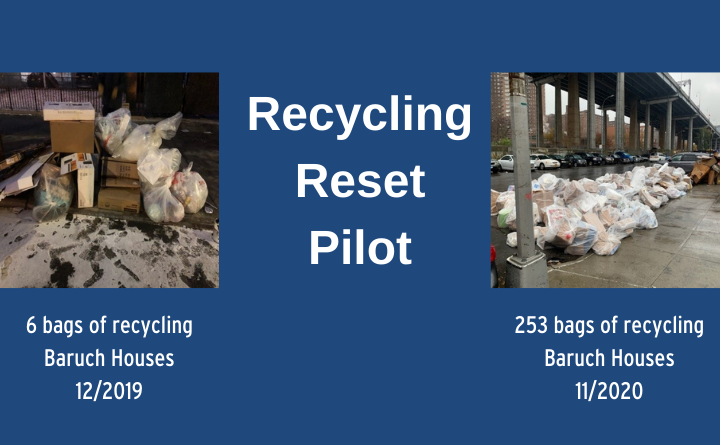NYCHA’s Recycling Reset Pilot Boosts Recycling Rates
Through the Recycling Reset pilot program, 12 of NYCHA’s developments in neighborhoods with high pest activity were able to improve their waste management procedures by establishing recycling programs. Maintained continuously throughout the pandemic, the recycling program has become a model for how NYCHA can improve its recycling rates and help increase the overall cleanliness of NYCHA developments. As part of the Mayor’s Neighborhood Rat Reduction initiative (NRR), NYCHA sought ways to better manage waste and recyclables. When recyclables are left unseparated from the waste stream, waste management is a more challenging job. Bags pile up faster, and it takes longer to transfer trash bags into sealed containers, which leads to an increase in rodent and pest activity. Recycling is required by law, and NYCHA is determined to raise its overall recycling rate from 2 to 3 percent to bring it in line with – and even exceed – the citywide average.
To increase recycling rates, NYCHA decided to pilot a “reset” initiative at 12 NRR sites: Baruch and Baruch Addition, Bushwick and Hylan, Butler, Marcy, Morris I and II, Riis I and II, and Webster and Morrisania. NYCHA partnered with the NYC Department of Sanitation (DSNY) and their contracted partner, GrowNYC, to help facilitate this pilot. To make the pilot successful, NYCHA needed to revamp staffing procedures in coordination with DSNY and update equipment and infrastructure needed to properly sort recyclable material. Once that work was done, the “recycling reset” pilot officially started in December 2019, led by NYCHA’s new Waste Management Department.
Once the pilot was launched, staff reported weekly bag counts of the recyclables they collected to the Waste Management Department. “One essential factor in starting the project was getting each of the developments engaged,” said Julia Shapiro, Project Manager in NYCHA’s Waste Management Department. “I knew the staff at the developments would appreciate the impact that recycling efforts could make. Recycling anywhere in the city benefits the city as a whole, and since NYCHA residents represent 6.5 percent of New York City’s overall population, we have the capability to make a real difference in the lives of all New Yorkers.”
The success of the recycling pilot required extensive collaboration at each of the participating sites. According to Albert Suggs, the Regional Asset Manager (RAM) overseeing Riis Houses, “This successful initiative was a team effort between NYCHA staff and residents, and it shows that there are no limits to what we can achieve when we work together.” Lawrence Harrison, an Assistant Resident Buildings Superintendent, echoed that sentiment, saying, “Here at Riis, it is totally a team effort.” Jose Oquendo, Director of NYCHA’s Waste Management Department, who helped oversee the program with Ms. Shapiro, cited the perfect acronym in getting to the heart of the pilot’s tremendous success: “TEAM: Together Everyone Accomplishes More.”
The teams have been recycling for a full year now, and not even the COVID-19 pandemic could stop them from doing this important work. During the pilot, whenever a significant milestone is reached, congratulations are sent out to the development staff that made it happen. “It’s a thrill for them to get well-deserved praise from the RAMs, the Borough Directors, and even the GM,” noted Ms. Shapiro.
“I am very proud of the tremendous amount of dedication and enthusiasm demonstrated by all 12 developments that participated in the Recycling Reset Pilot,” said Al Ferguson, NYCHA’s Vice President of Waste Management and Pest Control. “The success that has been realized can inspire others to elevate their recycling efforts.”
Reflecting on the great work accomplished to date, Ms. Shapiro said: “Now we see that our efforts are really making a difference. When the pilot first began, Baruch Houses reported just six bags of recyclable material, which was not atypical for a single site. In November 2020, the same development reported 253 bags of recyclables – a record high. Riis Houses, one of the larger developments, recorded 384 bags over the same period. At each site, the progress has been outstanding. Though the number of bags collected for recycling has varied, everyone involved has risen to the occasion. Throughout the pandemic, staff have remained dedicated to doing their best possible work, setting increasingly higher goals and breaking new records. Personally, I am grateful to have the opportunity to work with such dedicated people.”
“Partnering with NYCHA to increase the amount of recyclables collected at the pilot sites has allowed us to divert a significant amount of material from landfills, helped us work towards making our communities cleaner and healthier, and has also shown that despite the many challenges impacting recycling at large public housing developments, successful recycling is not only possible, but worth the effort,” said Kevin O’Sullivan, Deputy Director of Agencies, Institutions and Businesses at DSNY’s Bureau of Recycling and Sustainability, who collaborated on the pilot.
Based on the ongoing success, DSNY and NYCHA will determine how their collective efforts can be expanded.







